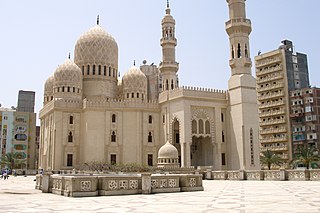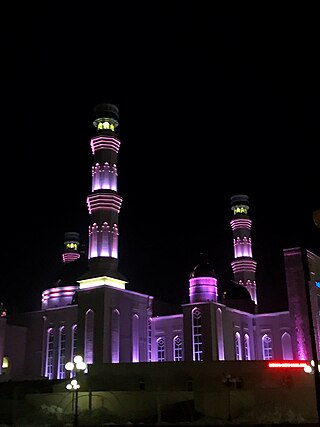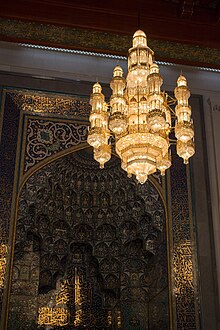
The Prophet's Mosque is the second mosque built by the Islamic prophet Muhammad in Medina, after the Quba Mosque, as well as the second largest mosque and holiest site in Islam, after the Masjid al-Haram in Mecca, in the Saudi region of the Hejaz. The mosque is located at the heart of Medina, and is a major site of pilgrimage that falls under the purview of the Custodian of the Two Holy Mosques.

The Sultan Salahuddin Abdul Aziz Shah Mosque is the state mosque of Selangor, Malaysia. It is located in Shah Alam and is the country's largest mosque and also the second largest mosque in Southeast Asia by capacity. Its most distinguishing feature is its large blue and silver dome. The mosque has four minarets, one erected at each of the corners.

The Sheikh Zayed Grand Mosque is a mosque located in Abu Dhabi, the capital city of the United Arab Emirates. It is the country's largest mosque, and is the key place of worship for daily Islamic prayers. There is a smaller replica of this mosque in Surakarta, a city in Indonesia. The late Sheikh Zayed bin Sultan Al Nahyan built this mosque to convey historic consequence and to embody the Islamic message of peace, tolerance and diversity.

Al Buraimi Governorate is one of the 11 governorates of Oman. The area was part of Ad Dhahirah Region until October 2006, when a new governorate was created from the Wilayats (Provinces) of Al Buraymi and Mahdah. A third wilayat, As-Sunaynah, was created from parts of the two. Dr. Hamad bin Ahmed Al Busaidi has been governor since 2020.

The Omar Ali Saifuddien Mosque or unofficially Sultan Omar Ali Saifuddin Mosque, is a mosque in Bandar Seri Begawan, the capital of Brunei. Omar Ali Saifuddien III, the 28th Sultan of Brunei, is credited with building the mosque, thus its name. It is one of the two state mosques, the other Jame' Asr Hassanil Bolkiah Mosque. One of the biggest and most striking mosques in the Far East, it was completed in 1958 at a cost of $5 million USD. The Mughal architecture of India had a significant effect on the design.

The Abu al-Abbas al-Mursi Mosque is an Egyptian mosque in the city of Alexandria. The historic mosque is named after the 13th century mystic Abu'l Abbas al-Mursi, who is also buried in the same place along with members of the Ashraf family.

The Sheikha Salama Mosque is a mosque in the city of Al Ain, Emirate of Abu Dhabi, the United Arab Emirates. Formerly the largest mosque in use in the city, it is named after Sheikhah Salamah, mother of Sheikh Zayed bin Sultan Al Nahyan, the father of Sheikh Khalifa.

Grand Jamia Mosque Lahore is a mosque located in Bahria Town, Lahore, Pakistan. With a capacity of 70,000 worshippers, it is the third largest mosque in Pakistan and the fourteenth largest mosque in the world.

The Jame' Asr Hassanil Bolkiah Mosque is a mosque in Bandar Seri Begawan, Brunei. It is named after Hassanal Bolkiah, the 29th Sultan of Brunei. It is one of the two state mosques, the other Omar Ali Saifuddien Mosque, and the largest of all. It is situated on the northern border of the Kampong Kiarong suburb, 3 kilometres (1.9 mi) northwest of Pusat Bandar.

Sheikh Khalifa Bin Zayed Al Nahyan Mosque, also known as Al Ain Grand Mosque, Sheikh Khalifa Bin Zayed Grand Mosque, or simply the Sheikh Khalifa Mosque, is the largest mosque in the city of Al Ain in the Emirate of Abu Dhabi, and one of the largest mosques in the United Arab Emirates. Open to the public since 12 April 2021, it is named after Sheikh Khalifa bin Zayed Al Nahyan, who was the Ruler of Abu Dhabi and President of the United Arab Emirates from November 2004 until his death in May 2022.

The Sheikh Zayed Mosque, Fujairah, is the main mosque in the Emirate of Fujairah, and the second largest in the U.A.E. after the mosque with the same name in Abu Dhabi.

The Sharjah Mosque, is the largest mosque in the Emirate of Sharjah, the U.A.E. Besides serving the needs of Muslims, the mosque has a library, and an area for giving Dawah to non-Muslims.

Al Buraimi is an oasis city and a wilayah (province) in northern Oman, on the border with the U.A.E. It is the capital of Al Buraimi Governorate and is located approximately 343 km from the national capital Muscat. It is bordered by the U.A.E. city of Al Ain, and the wilayas Mahdah and Dhank.

The Sultan Qaboos Grand Mosque is a mosque located in Sohar, Oman. It was named after the previous Sultan of Oman, Qaboos bin Said.

The Nauan Hazrat Mosque is a mosque in the center of Kokshetau, the capital of Akmola Region, in the northern part of Kazakhstan. Built between 2010 and 2015 by the city's population's donations, its minarets 45.5 metres (149 ft) in height and the dome is 25 metres (82 ft) high.

The Al-Hasan Mosque has a combination of ancient, traditional and modern Islamic art. It has 12 domes, two minarets, and the biggest mihrab in Bahrain. The mosque was built by Mohamed bin Yusuf Al-Hasan.

The Sheikh Zayed Grand Mosque, Solo is a mosque in Solo, Indonesia, which is a smaller replica of the grand mosque in Abu Dhabi, the U.A.E. Built at a cost of US$ 20 million, it is named in honour of the UAE's founder, Sheikh Zayed bin Sultan Al Nahyan.





























